Research & Innovation
ISRA Research Management Centre (ISRA RMC), via its Research Development and Innovation Department (RDI), is instrumental in advancing INCEIF University’s position as a leader in research excellence.
By providing essential support and resources, ISRA RMC facilitates the research activities of faculty members and researchers, enabling them to pursue cutting-edge research in Shariah, Islamic economics and finance. ISRA RMC’s commitment to fostering a dynamic research environment ensures that INCEIF University remains at the forefront of innovation and thought leadership within the global Islamic finance industry.
Various innovative research projects in Islamic economics and finance have been initiated, with a particular emphasis on the practical implementation of Shariah principles. These efforts aim to disseminate knowledge and enhance awareness within the Islamic finance industry and among stakeholders, including regulators and practitioners.
Moreover, ISRA RMC contributes to strengthening human capital development in Shariah expertise relevant to Islamic finance and provides a platform for greater engagement amongst practitioners, scholars, regulators, and academicians via research and dialogue in both the domestic and international arenas.
Through pioneering research and rigorous intellectual dialogue, ISRA RMC aims to promote innovation and dynamism and thus extend the boundaries of Islamic finance. It is envisioned that with greater research and dialogue, mutual respect and recognition will emerge within the global community of the Islamic financial industry.

Key Research Areas

Maqasid of Islamic Economics
This refers to the objectives or goals of Islamic economics, which are intended to achieve justice, fairness and welfare in society. The maqasid guides the ethical and moral dimensions of economic activities, ensuring that they align with the principles of Shariah.

Applied Shariah
The term refers to the practical implementation of Shariah principles in Islamic financial institutions’ operations, products and services. This includes ensuring that all financial transactions and contracts are in full compliance with Islamic law.

Islamic Fintech
Islamic fintech involves the integration of financial technology with Islamic finance principles. It focuses on developing and applying tech-driven solutions for financial services that comply with the Shariah, such as digital banking, crowdfunding and blockchain-based Islamic financial products.

Shariah Governance
Shariah governance refers to the framework and processes through which Islamic financial institutions ensure that their operations and products comply with the Shariah. This includes oversight by Shariah boards, audits and continuous monitoring to maintain compliance.

Halal Framework
The halal framework establishes guidelines and standards for determining what is permissible in various industries. It ensures that products and services meet end-to-end Shariah requirements, from sourcing and production to certification and consumption.
Impactful Research Projects
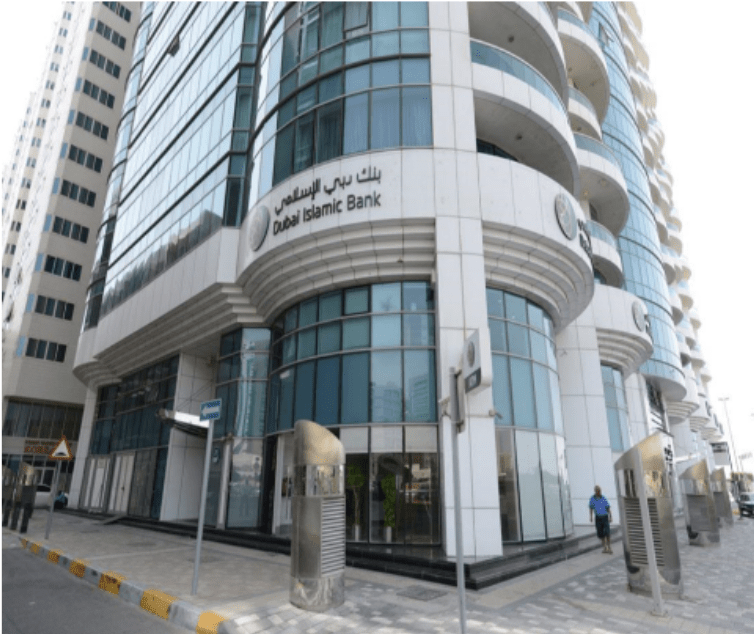
Maqasid Shariah Index (2023)
Dubai Islamic Bank
This research aims to develop a comprehensive Maqasid index to evaluate the compliance of Islamic banks with maqasid al-Shariah. The index will be designed to adapt to the evolving nature of the Islamic banking and finance industry, ensuring it remains relevant as the sector develops. Additionally, the study seeks to integrate maqasid indicators with Environmental, Social and Governance (ESG) factors and the Sustainable Development Goals (SDGs) in a manner that aligns with Shariah principles. Ultimately, the research will provide the Islamic banking industry with a tool to prioritise business activities based on the Maqasid index score, helping banks align their operations with both Islamic ethical standards and global sustainability objectives. The research is sponsored by Dubai Islamic Bank, and the index under development is expected to be utilised by every Islamic bank wanting to measure its compliance with maqasid al-Shariah.
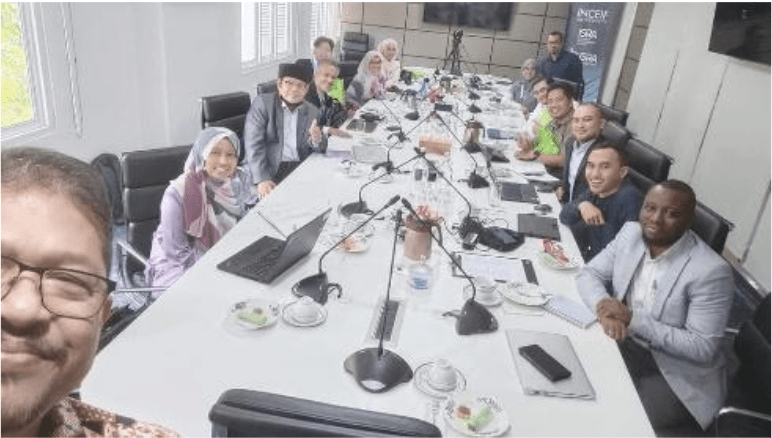
Shariah Issues Relating to Resolution of Islamic Banks (2023)
This research explores Shariah issues pertaining to the resolution of non-viable Islamic banks, with a primary focus on the transfer mechanism. This research identifies Shariah considerations that justify the resolution of Islamic banks; investigates how different Islamic banking models affect Shariah treatments in an Islamic bank’s resolution; examines the potential Shariah issues about the various resolution options for Islamic banks and provides Perbadanan Insurans Deposit Malaysia (PIDM) with relevant solutions to overcome the issues; as well as facilitates PIDM in the removal of any impediments to a Shariah-compliant transfer of business by making the business of Islamic banks transfer ready. The findings of this research would significantly impact the Islamic banking industry in Malaysia as it sets a basis for PIDM’s proposal to the Shariah Advisory Council of Bank Negara Malaysia on the resolution of Islamic banks in Malaysia.

ESG-i Assessment Framework: Empowering Sustainable and Ethical Growth for Micro, Small and Medium-Sized Enterprises (2023)
The ESG-i Assessment Framework serves as a starting point for MSMEs to understand complex sustainability frameworks and taxonomies that are incongruent with their operational reality. By incorporating Shariah principles and embracing the Quadruple Bottom Line (QBL) concept—Planet, People, Profit, and Principle—the framework provides a comprehensive blueprint for evaluating sustainability practices among MSMEs. In contrast to the existing frameworks, the ESG-i Assessment Framework simplifies the criteria for evaluating sustainability practices among MSMEs and provides them with an assessment tool to comprehend and integrate into their businesses, regardless of their size and scale. The ESG-i Assessment Framework is increasingly crucial as the European Union’s Carbon Border Adjustment Mechanism is set to take effect in 2024, bringing about substantial implications for the Malaysian economy, particularly impacting MSMEs, which contribute over 16 per cent to the country’s exports.
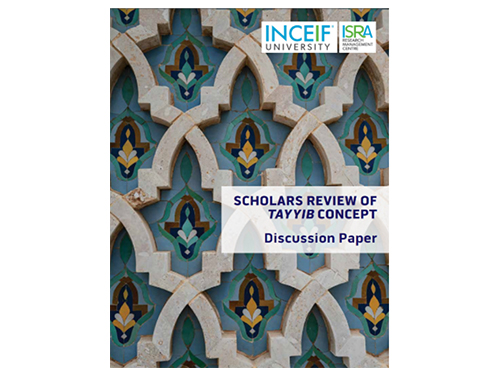
Developing the Tayyib Framework for Islamic Finance Institutions in Malaysia (2023)
The tayyib concept represents a transformative approach in Islamic finance, elevating it beyond mere Shariah compliance (halal) to reach the heights of socially, environmentally, and economically beneficial (tayyib). It aims to position Islamic finance as a global leader in ethical and responsible financial practices. Beyond being a national initiative, tayyib calls for global collaboration to integrate its principles across all Islamic financial markets, ensuring that every financial decision aligns with the maqasid al-Shariah. By operationalising tayyib through collective effort, Islamic finance can fulfil its promise of advancing welfare for all.

Islamic Banking in Malaysia: Past, Present and Future (2023)
This research documents Malaysia’s pioneering role and leadership in developing the Islamic finance industry, with a particular focus on Islamic banking. It captures the thought processes underpinning key progressive efforts and improvement exercises through interviews with eminent leaders of Islamic banking and finance, including regulators, Shariah scholars and practitioners from the past and present. In this discourse, the successful journey of Maybank Islamic as the largest Islamic commercial bank and its contributions to the overall growth and development of the Islamic banking industry in Malaysia is highlighted.
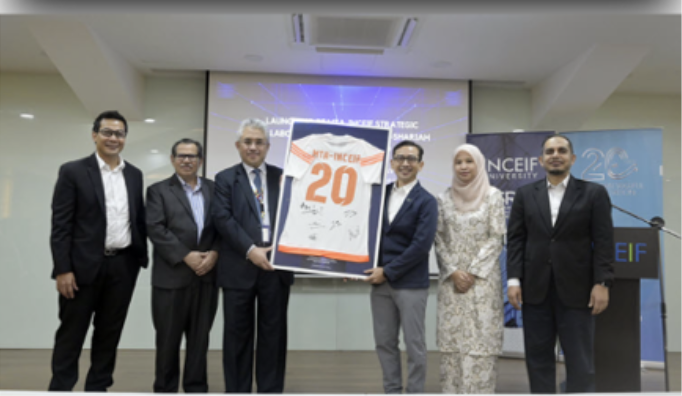
Developing Maqasid al-Shariah-based Value-Based Intermediation for Takaful (VBIT) Scorecard (2022)
The Maqasid al-Shariah Scorecard (MSS) for the Malaysian takaful industry aims to provide measurable performance indicators to assess the growth and impact of the industry, aligning it with maqasid al-Shariah. The initiative follows the launch of Malaysia’s Financial Sector Blueprint (2022–2026) and the Value-Based Intermediation for Takaful (VBIT) Roadmap. The MSS will also solidify Malaysia’s position as a leader in operationalising maqasid in takaful, benefiting both the industry and vulnerable communities. The scorecard is expected to reinforce stakeholders’ confidence in takaful, ensuring resilience and compliance with Shariah principles.
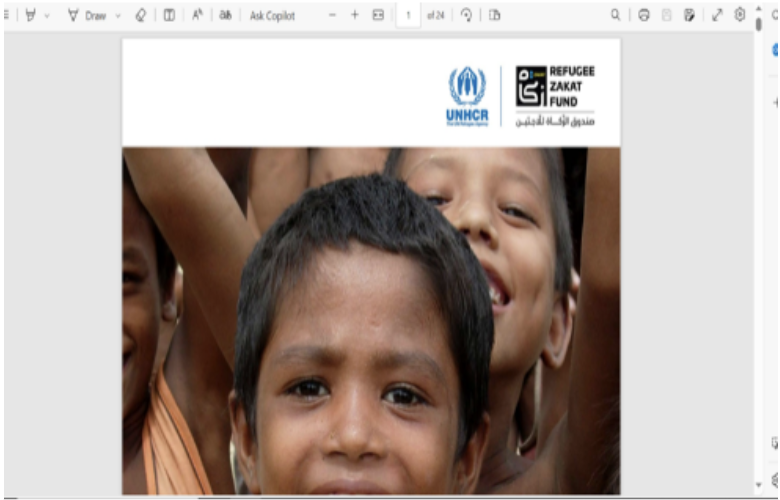
Shariah Endorsement of UNHCR Zakat Fund and Report on Zakat Potential in the Asia Pacific Region (2020)
This project provides an endorsement that the collection and distribution of zakat by UNHCR, the United Nations Refugee Agency, are conducted in accordance with Shariah, allowing Muslims to confidently contribute their zakat to support refugees and displaced persons through this fund.
In addition, the project provides a report that analyses the potential for zakat collection in this region. It examines the opportunities and challenges in mobilising zakat funds to support social welfare and humanitarian causes within Asia Pacific, highlighting the region’s capacity to contribute significantly to global zakat resources.
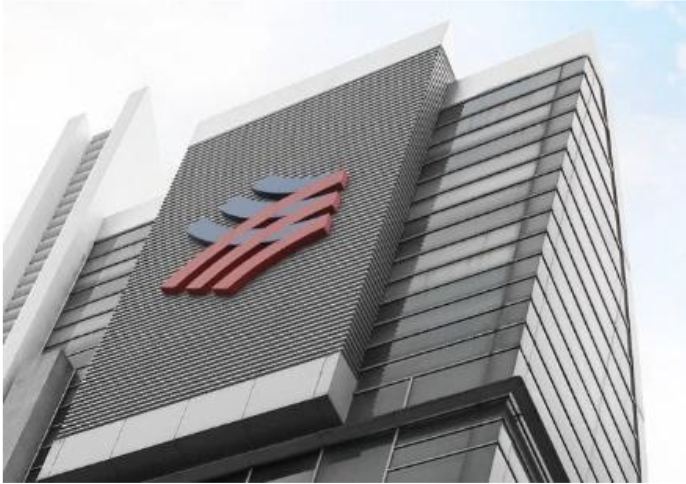
New Takaful Model for Market Competitiveness (2020)
This new proposed takaful model, which was undertaken in collaboration with Hong Leong MISG Takaful (HLMT), adopts the concept of musharakah ta’awuniyyah, where both the takaful operator and participants contribute to a mutual fund known as the Musharakah Ta’awuniyyah Fund (MTF). This model is uniquely designed to uphold the principle of ta’awun (mutual assistance) while achieving competitive business outcomes.
ASM i-Connect Program (2020)
In 2020, INCEIF was appointed by the Academy of Sciences Malaysia (ASM) as the Neutral Entity for the i-Connect Fintech in Islamic Finance Program (i-Connect). i-Connect is an industry-led collaborative network that involves quadruple helix—industry, research community, government and civil society—to help Malaysian industries developing innovative home-grown products and solutions by leveraging on science and technology. INCEIF successfully managed the programme under a three-year contract, which concluded in December 2023.

Maqasid Shariah Index (2023)
Dubai Islamic Bank
This research aims to develop a comprehensive Maqasid index to evaluate the compliance of Islamic banks with maqasid al-Shariah. The index will be designed to adapt to the evolving nature of the Islamic banking and finance industry, ensuring it remains relevant as the sector develops. Additionally, the study seeks to integrate maqasid indicators with Environmental, Social and Governance (ESG) factors and the Sustainable Development Goals (SDGs) in a manner that aligns with Shariah principles. Ultimately, the research will provide the Islamic banking industry with a tool to prioritise business activities based on the Maqasid index score, helping banks align their operations with both Islamic ethical standards and global sustainability objectives. The research is sponsored by Dubai Islamic Bank, and the index under development is expected to be utilised by every Islamic bank wanting to measure its compliance with maqasid al-Shariah.

Shariah Issues Relating to Resolution of Islamic Banks (2023)
This research explores Shariah issues pertaining to the resolution of non-viable Islamic banks, with a primary focus on the transfer mechanism. This research identifies Shariah considerations that justify the resolution of Islamic banks; investigates how different Islamic banking models affect Shariah treatments in an Islamic bank’s resolution; examines the potential Shariah issues about the various resolution options for Islamic banks and provides Perbadanan Insurans Deposit Malaysia (PIDM) with relevant solutions to overcome the issues; as well as facilitates PIDM in the removal of any impediments to a Shariah-compliant transfer of business by making the business of Islamic banks transfer ready. The findings of this research would significantly impact the Islamic banking industry in Malaysia as it sets a basis for PIDM’s proposal to the Shariah Advisory Council of Bank Negara Malaysia on the resolution of Islamic banks in Malaysia.

ESG-i Assessment Framework: Empowering Sustainable and Ethical Growth for Micro, Small and Medium-Sized Enterprises (2023)
The ESG-i Assessment Framework serves as a starting point for MSMEs to understand complex sustainability frameworks and taxonomies that are incongruent with their operational reality. By incorporating Shariah principles and embracing the Quadruple Bottom Line (QBL) concept—Planet, People, Profit, and Principle—the framework provides a comprehensive blueprint for evaluating sustainability practices among MSMEs. In contrast to the existing frameworks, the ESG-i Assessment Framework simplifies the criteria for evaluating sustainability practices among MSMEs and provides them with an assessment tool to comprehend and integrate into their businesses, regardless of their size and scale. The ESG-i Assessment Framework is increasingly crucial as the European Union’s Carbon Border Adjustment Mechanism is set to take effect in 2024, bringing about substantial implications for the Malaysian economy, particularly impacting MSMEs, which contribute over 16 per cent to the country’s exports.

Developing the Tayyib Framework for Islamic Finance Institutions in Malaysia (2023)
The tayyib concept represents a transformative approach in Islamic finance, elevating it beyond mere Shariah compliance (halal) to reach the heights of socially, environmentally, and economically beneficial (tayyib). It aims to position Islamic finance as a global leader in ethical and responsible financial practices. Beyond being a national initiative, tayyib calls for global collaboration to integrate its principles across all Islamic financial markets, ensuring that every financial decision aligns with the maqasid al-Shariah. By operationalising tayyib through collective effort, Islamic finance can fulfil its promise of advancing welfare for all.

Islamic Banking in Malaysia: Past, Present and Future (2023)
This research documents Malaysia’s pioneering role and leadership in developing the Islamic finance industry, with a particular focus on Islamic banking. It captures the thought processes underpinning key progressive efforts and improvement exercises through interviews with eminent leaders of Islamic banking and finance, including regulators, Shariah scholars and practitioners from the past and present. In this discourse, the successful journey of Maybank Islamic as the largest Islamic commercial bank and its contributions to the overall growth and development of the Islamic banking industry in Malaysia is highlighted.

Developing Maqasid al-Shariah-based Value-Based Intermediation for Takaful (VBIT) Scorecard (2022)
The Maqasid al-Shariah Scorecard (MSS) for the Malaysian takaful industry aims to provide measurable performance indicators to assess the growth and impact of the industry, aligning it with maqasid al-Shariah. The initiative follows the launch of Malaysia’s Financial Sector Blueprint (2022–2026) and the Value-Based Intermediation for Takaful (VBIT) Roadmap. The MSS will also solidify Malaysia’s position as a leader in operationalising maqasid in takaful, benefiting both the industry and vulnerable communities. The scorecard is expected to reinforce stakeholders’ confidence in takaful, ensuring resilience and compliance with Shariah principles.

Shariah Endorsement of UNHCR Zakat Fund and Report on Zakat Potential in the Asia Pacific Region (2020)
This project provides an endorsement that the collection and distribution of zakat by UNHCR, the United Nations Refugee Agency, are conducted in accordance with Shariah, allowing Muslims to confidently contribute their zakat to support refugees and displaced persons through this fund.
In addition, the project provides a report that analyses the potential for zakat collection in this region. It examines the opportunities and challenges in mobilising zakat funds to support social welfare and humanitarian causes within Asia Pacific, highlighting the region’s capacity to contribute significantly to global zakat resources.

New Takaful Model for Market Competitiveness (2020)
This new proposed takaful model, which was undertaken in collaboration with Hong Leong MISG Takaful (HLMT), adopts the concept of musharakah ta’awuniyyah, where both the takaful operator and participants contribute to a mutual fund known as the Musharakah Ta’awuniyyah Fund (MTF). This model is uniquely designed to uphold the principle of ta’awun (mutual assistance) while achieving competitive business outcomes.
ASM i-Connect Program (2020)
In 2020, INCEIF was appointed by the Academy of Sciences Malaysia (ASM) as the Neutral Entity for the i-Connect Fintech in Islamic Finance Program (i-Connect). i-Connect is an industry-led collaborative network that involves quadruple helix—industry, research community, government and civil society—to help Malaysian industries developing innovative home-grown products and solutions by leveraging on science and technology. INCEIF successfully managed the programme under a three-year contract, which concluded in December 2023.

Academy Science Malaysia (ASM) I-Connect
Principal Researcher
Dr Kinan Salim
Azli Sham Zakaria (Consultant)
Duration: January 2023 December 2023

White Paper on ESG-I Assessment Framework
Principal Researcher
Dr Imene Tabet
Team Members
Dr Marjan Muhammad
Khairun Nisaq Taslim
May 2023- August 2023

Enhancing Provision and Protection for Malaysia’s Ageing Population through a Cash Waqf Takaful Model
Principal Researcher
Prof Dr Aishath Muneeza
Team Members
Dr Sherin Kunhibava
July 2023 – December 2023
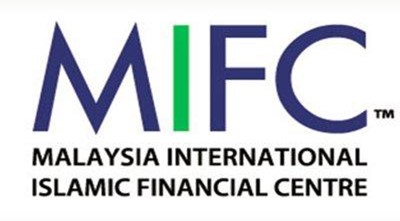
Tayyib Framework for financial sustainability based on Maqasid Shariah
MIFC
Principal Researcher:
Prof Dr Said Bouheraoua
Team Members:
Dr Noor Suhaida Kasri
Prof Dr Younes Soualh
Duration: July 2023 – December 2023 Extended March 2024

AIBIM – Content Writer of Value-Based Intermediation (VBI) Report 2022
Principal Researcher
Mezbah Uddin Ahmed
Team Members
Dr Noor Suhaida Kasri
Dr Imene Tabet
Khairun Nisaq Taslim
August 2023 – October 2023

Tokenisation Business Case for Centralised Digital Exchange
Principal Researcher:
Prof Dr Zulkarnian Mat Sori
January 2024 – August 2024 (Ongoing)

Book - Financing the Future: Islamic Finance and Humane Development
Principal Researcher:
Prof Dr Tariqullah Khan
Team Member:
Dr Imene Tabet
1 April 2024 – 30 September 2024 (Ongoing)

Empowering Survivors: Islamic Financial Institutions Allies in Breaking the Cycle of Domestic Violence
Principal Researcher:
Prof Dr Aishath Muneeza
May l 2024 – October 2024 (Ongoing )

Payment of Interest/benefits above the qard amount by a third party: its ruling and contemporary applications
Principal Researcher:
Dr Marjan Muhammad
June 2024 – August 2024 (On going)

Book – Financial Reporting for Islamic Financial Institutions: AAOIFI- and IFRS-based Approach
Principal Researcher:
Mezbah Uddin Ahmed
Team Members:
Dr Marjan Muhammad
Prof Dr Zulkarnain Muhammad Sori
1 April 2024 – 31 March 2026 (On going)

Enhancing Shariah Components in NAMLIFA Takaful Module
Principal Researcher
Prof Dr Younes Soualhi
Team Member
Dr Fares Djafri
April 2024 – June 2024 (On going)
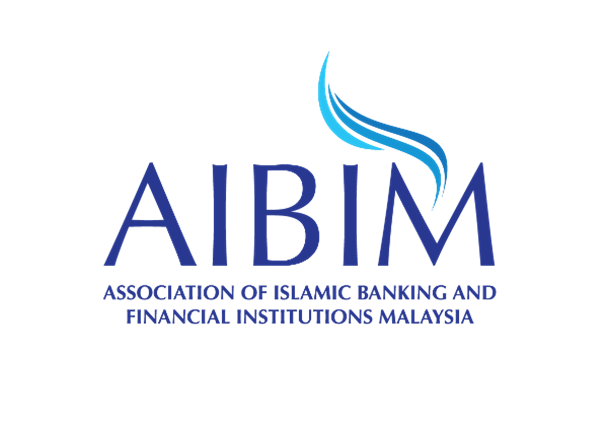
Content Writer for Value-Based Intermediation Report 2023
AIBIM
Principal Researcher
Mezbah Uddin Ahmed
Team Members
Prof Dr Said Bouheraoua
Dr Noor Suhaida Kasri
July 2024 – October 2024 (On going)
For enquiries and information
Please contact research-isra@inceif.edu.my | +603 – 7651 4223

INCEIF UNIVERSITY
University Registration No. DU018 (W)
ISRA Research Management Centre (ISRA RMC)
Jalan Tun Ismail,
50480 Kuala Lumpur,
Malaysia
(Company No. 200501036588 (718736-K))

Phone | 03 7651 4202

Email | rmc-isra@inceif.edu.my


